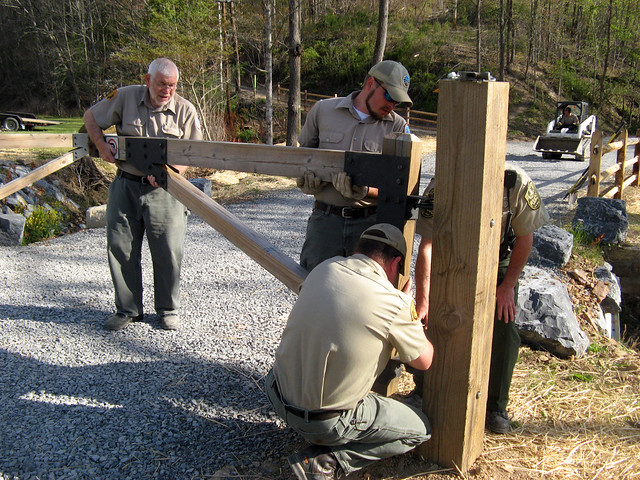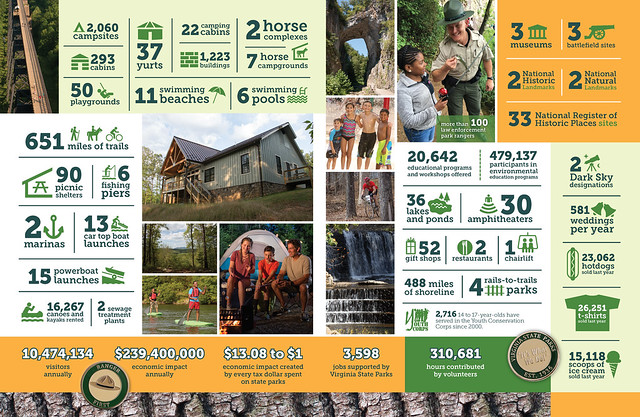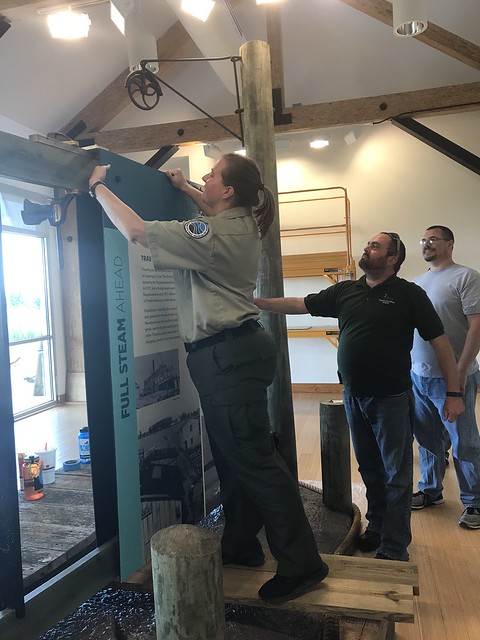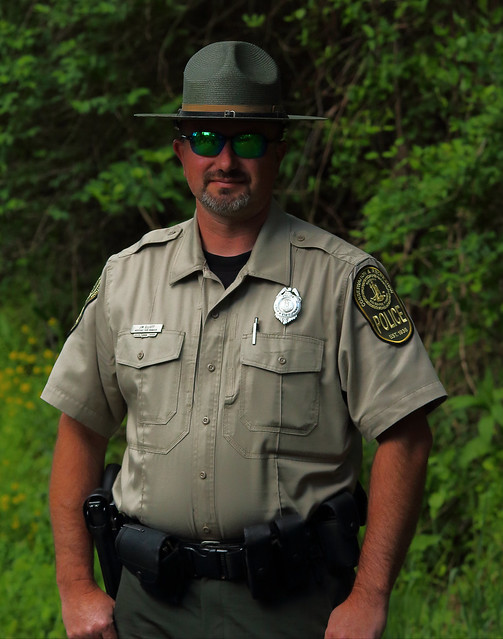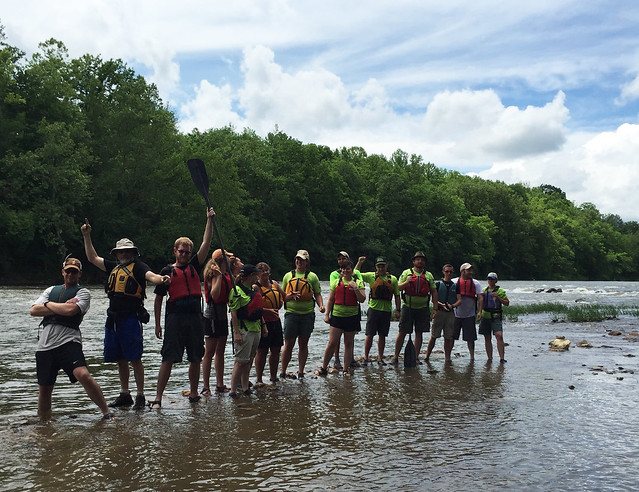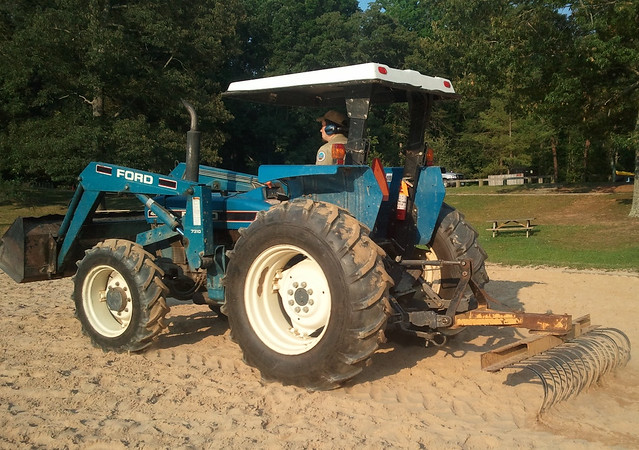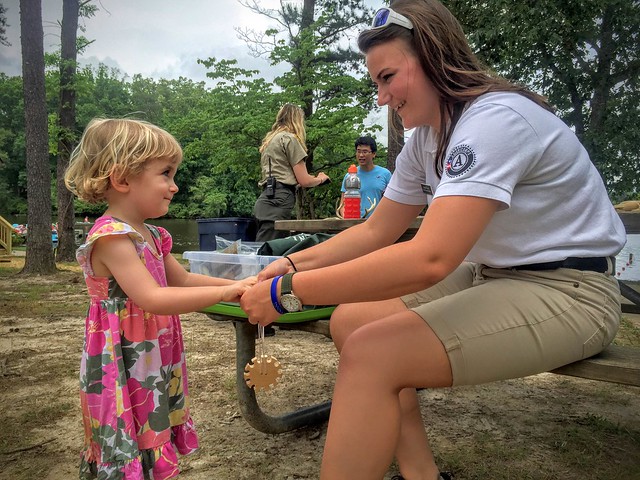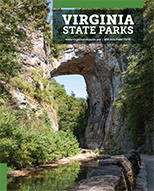Due to the expected impact of the winter storm, all Virginia State Park overnight facilities will be closed from Friday, Jan. 23 through Tuesday, Jan. 27. This decision is based on the forecast for unsafe conditions and potential power outages. For updates click here.
Read Our Blogs
The Business of Running a Park
For my last article in my series in honor of Public Lands Week, Sept. 22-29, I wanted to give our visitors a peek behind the curtain. Our park staff are often told that they have a dream job. Indeed, we have some committed and dedicated staff that work more hours than they are compensated for, all for the love of what they do. But a career in parks isn't communing with nature 8 hours a day. Rather, it's cleaning a public restroom on a holiday weekend, dealing with a belligerent drunk in the campground, trying to make a schedule work without enough staff - well, you get the idea.
Trail work at Hungry Mother State Park
A Park Ranger gets to work when it is 100 degrees and the humidity makes it more like 110; gets to work in subfreezing temperatures; gets to work in spite of rain, snow, mud, mosquitoes, ticks, chiggers, trees across roads. You get to snake out a drain one minute and find a lost hiker the next.
I have worked for Virginia State Parks for more than twenty-two years but the closest thing I have come to working IN a park is helping with a special event or the one time I worked in the contact station of our busiest camping park on a Friday in the summer. I did the latter when I first started working as the Manager of what we now call our Customer Service Center and it served me well over the years in understanding a fraction of what it is like working every day in a park. No matter how upset a customer gets with me over the phone, it will never compare to when they are standing in front of you and something is wrong about their vacation and, whether it is or not, they think it's your fault.
Why Park Rangers love what they do
Still, we have staff who love their jobs. We have three staff retiring the end of the year with more than 35 years of service each. I am sure if you asked them you'd get a variety of answers but I think it comes down to a love of what our parks are - beautiful places with amazing resources - natural, historical, cultural. Special places that provide an affordable venue for individuals and families to get away from the stress of everyday life, their own jobs and everyday concerns, and relax and recreate in nature. I think it becomes a calling, not a career and I am so proud to know the men and women who are called to the life of a Park Ranger.
But I promised a behind the scenes look at running a park. In many ways it's a lot like a small town or city. Since folks were always surprised at the variety of what our staff do, our Director had the idea to come up with a pictorial that described it.
To run the analogy of a city, we have public works, some parks are on local water and sewer but many more have their own wells and waste water treatment plants. We have our own police force (law enforcement rangers) and all of them have training and certification equivalent to an officer in your local police department. We purchase goods and services and because of state policies and processes spend a lot of time sourcing goods from small and micro vendors. We can't just go online and order from Amazon. We hire and manage staff.
We run gift shops, snack bars and restaurants. Years ago (they were close to being gone when I started 22 years ago) we contracted out many of the beach and swimming areas, restaurants, and boat rental operations. Over time it became harder and harder to find folks we could contract with to do that so we too over management of those areas and learned how to excel in those areas as well.
Did I mention exhibit design, fabrication and installation?
Staff work on the Belle Isle State Park exhibit
When things break, we can fix most of them, and if not, we have to hire professionals to do it for us. When we build or renovate facilities, our staff monitor the process. We manage a fleet of vehicles including heavy equipment like dump trucks and tractors.We take management of our natural resources very seriously, with specialists trained to fight invasive species, manage forests and open spaces for wildlife, develop and maintain trails so they are sustainable.
Staff Wear Many Hats -
Assistant Park Manager Jimmy Elliott, New River Trail State Park
We operate on a 365 day schedule with many of our parks open 24 hours a day (the ones with overnight accommodations), yet most parks have less than ten full time employees. People used to say that if you had a job with a variety of responsibilities crossing multiple you were a "Jack of All Trades, Master of None." In today's society every one of those management areas are highly regulated and take specific training so a State Park Ranger is a "Master of All." While your city or county police officer spends his work day being a police officer, ours also manage budgets, procure goods, hire and train all levels of staff, find water leaks, talk to customers, handle complaints, and get up each day and start all over again. And we do all of this while serving ten million visitors: helping customers when they lock their keys in the car, lose their cell phone, stopping to wipe the tears from a child who has skinned their knee, rescuing a kite out of a tree.
It takes a lot of training to do the job
Staff celebrate the completion of their canoe training
When it comes down to it, what makes a Park Ranger get up every day and start again is the smile of a child when she catches her first fish, a note in a cabin journal that the vacation is what their family needed to get through a bad patch in their life, a story from a visitor who talks about coming to the park as a child and now is bringing their own children back. The Park Ranger knows those things happen all the time and when someone stops to tell them, it is just the reassurance they need to know that what they do is important and makes a difference.
Grooming the beach
We know there are other special people out there looking for their "calling" in Parks. Maybe they don't even know it yet. We have some great training programs to help guide this calling. You too might have the stuff to be a Park Ranger. We start them young working as seasonal staff - lifeguards, maintenance, contact rangers - when they are in high school and college. I can think of several Park Managers who started out that way. But we also have great opportunities for folks who have tried other careers, even retired, and are looking for something more. Check out our careers page and watch our video.
Future Rangers? An AmeriCorps member connects with a young park guest
In case you missed the other blogs in the series:
What is a Park Worth? A Look at the Economic Impact of Nature from ChildrenandNature.org. Check out the economic impact of Virginia State Parks here.
If you have read the article and have a question, please email nancy.heltman@dcr.virginia.gov.
Search for blogs
By Park
Categories
Cabins
Camping
Fishing
History and Culture
Other
Programs and Events
Trails
Volunteers
Water Fun
Archive
2026
2025
2024
2023
2022
2021
2020
2019
2018
2017
2016
2015
2014
2012

